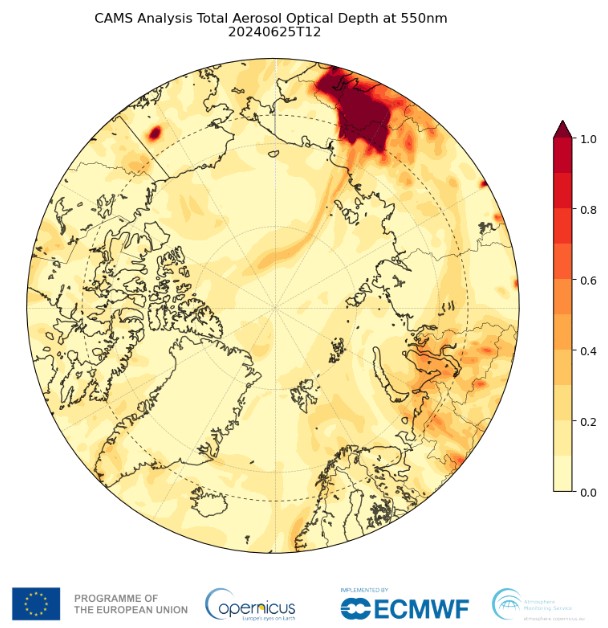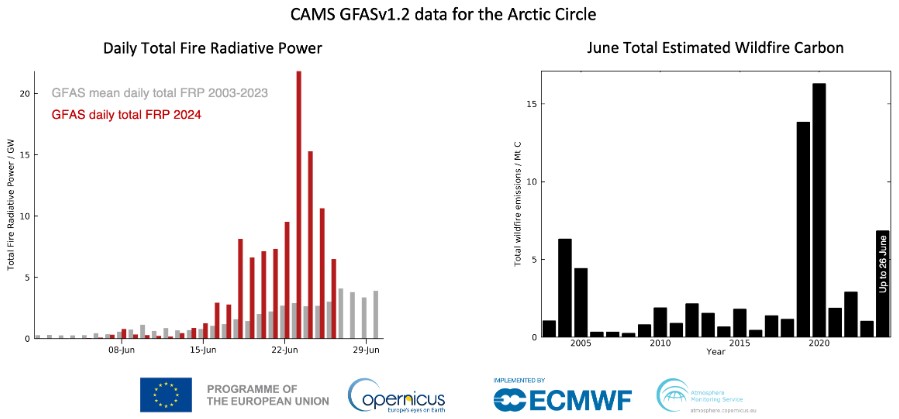Record Wildfires burn in the Arctic Circle
According to Copernicus, the European Union’s climate change monitoring system, wildfires are sweeping across the Arctic Circle at an alarming rate, with thousands of square kilometers of land already affected.
The devastating fires are fueled by hot and dry conditions exacerbated by climate change, and are having a profound impact on the region’s delicate ecosystems and indigenous communities.
BBC: It is the third time in the past five years that high intensity fires have swept across the region.
In a statement released on Thursday, Copernicus reported higher air temperatures and drier conditions in Sakha, Russia, which are rendering the ideal conditions for wildfires once there is a spark.
Quoted by Russia state news agency Tass, the region’s deputy minister of ecology, management and forestry said more than 160 wildfires affected nearly 460,000 hectares of land up until 24 June.
Scientists are concerned that smoke from the flames will hinder the ability of the Arctic ice to reflect solar radiation – which would mean both the land and sea absorb more heat.
Professor Gail Whiteman from the University of Exeter told the BBC that the Arctic region was “ground zero for climate change”.
“The increasing Siberian wildfires are a clear warning sign that this essential system is approaching dangerous climate tipping points,” she said.
“What happens in the Arctic doesn’t stay there,” she added, saying that these fires are “a warning cry for urgent action”.
Prof Guillermo Rein, Professor of Fire Science, Imperial College London, called the fires a “growing monster of climate change”.
“A decade ago, Arctic wildfires were considered rare events, hardly ever studied. Now they are happening in all summer sessions and at increasing burn scar,” he told the BBC.
As climate change raises Arctic temperatures, wildfires have shifted north where they burn through boreal forest and tundra, releasing vast amounts of greenhouse gases from carbon-rich organic soils.
Separately, Arctic sea-ice has been declining rapidly since the 1980s.
Large wildfires return to the Arctic Circle in June 2024

CAMS total aerosol optical depth analyses indicating smoke transport around the Arctic and high northern latitudes on 25 June 2024. (Source: CAMS).
Copernicus: The Copernicus Atmosphere Monitoring Service (CAMS) has been tracking wildfire emissions and resulting smoke transport in the Arctic Circle during June 2024. The majority of the wildfires are burning in the Sakha Republic of Russia, which experienced extensive high intensity wildfires in the summer of 2021. CAMS Global Fire Assimilation System (GFAS) dataset shows that June wildfire carbon emissions for the month are already the third highest in the last two decades, behind the significant fire seasons of 2019 and 2020.
The Arctic region of the Sakha Republic has been experiencing much higher surface air temperatures and drier surface conditions than usual for the time of year, providing the environmental conditions conducive to wildfires following ignition. CAMS scientists have been monitoring a significant increase in daily total fire radiative power (FRP), indicating the intensity of the fires, and smoke emissions across the region.
The June monthly total carbon emissions from the wildfires, estimated by CAMS from the FRP observations, are the third highest of the past two decades, at 6.8 megatonnes of carbon, behind June 2020 and 2019, which recorded 16.3 and 13.8 megatonnes of carbon respectively.

Mark Parrington, Senior Scientist at the Copernicus Atmosphere Monitoring Service, says: “In the wildfire emissions monitoring that we do in CAMS we pay particular attention to high northern latitudes and the Arctic during the summer months. Fire emissions in the Arctic have been at fairly typical levels for the last three summers but we have observed the recent fires developing following warmer and drier conditions, similar to the widespread wildfires in 2019 and 2020. This is the third time since 2019 that we are observing significant Arctic wildfires and showed that this northeast region of the Arctic has experienced the largest increase in extreme wildfires over the last two decades.”
Changes in the Arctic climate are of great significance for everyone, as they impact the Earth system as a whole. With this in mind, CAMS has been cooperating with Arctic Basecamp on translating wildfire data into an alert system for remarkable climate events in the Arctic.
Gail Whiteman, Professor at the University of Exeter and founder of Arctic Basecamp comments: “The Arctic is ground zero for climate change and the increasing Siberian wildfires are a clear warning sign that this essential system is approaching dangerous climate tipping points. What happens in the Arctic doesn’t stay there – Arctic change amplifies risks globally for all of us. These fires are a warning cry for urgent action.”
In addition to the wildfires in the Arctic, CAMS has also been closely following the intensity and emissions of wildfires burning in the Pantanal wetlands, located in Brazil, Bolivia and Paraguay. In the Brazilian province of Mato Grosso do Sul, (where most of the Pantanal wetlands are located) daily total FRP has been significantly above average for several weeks, and the total carbon emissions for May and June are more than double the previous highest values in the GFAS dataset during May-June 2009. The May-June total estimated emissions are also the highest of the past two decades for Bolivia and Paraguay and the highest for Brazil since 2004.
Related
About the Author: CLIMATE STATE
POPULAR
COMMENTS
- The risk with the path to a hothouse Earth | Climate State on Climate Tipping Points Existential Threat to Our Life Support Systems
- Robert Schreib on Electricity generation prices may increase by as much as 50% if only based on coal and gas
- Robert Schreib on China made a historic commitment to reduce its emissions of greenhouse gases
- Lee Nikki on COP30: Climate Summit 2025 – Intro Climate Action Event
- Hollie Bailey on Leaders doubled down on fossil fuels after promising to reduce climate pollution


